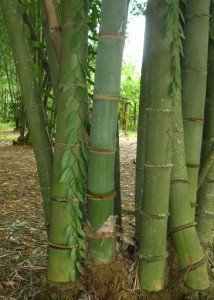Bamboo in many countries around the world is becoming the new “green” eco-friendly building material and Myanmar has an enviable position of being home to the third – largest reserve of bamboo forests in the world.
The over 100 species of bamboo that grow in Myanmar have exotic names ranging from Bambusa Affinis to Yushania wardii and the size of some of the bamboo seen around the country is immense. The largest Bamboo grown in Myanmar is the Dendrocalamus giganteus Munro and it grows to a height of over 100 feet and is found from Upper Chindwin through the Shan hills and down to Moulmein.
Both The Bamboo Lovers Network and the recently formed Myanmar Bamboo Growers, Producers and Exporters Group are working hard to raise awareness of the enormous business potential of this sustainable grass for the country.
- Yes, Bamboo is a grass ….. not a tree and Bamboo produces 30% more oxygen than trees.
- Bamboo can be harvested every 3-5 years as opposed to the 20 to 50 years of its’ wood counterparts.
- Bamboo does not need replanting, as if harvested correctly, it is self-generating.
- Bamboo is as strong as steel.
- Bamboo is ecologically adaptable.
- Bamboo can be amazingly straight yet highly flexible.
- Bamboo plants reduce runoff and helps prevent water pollution through its’ high nitrogen consumption.
- Bamboo does not need pesticides, chemicals, herbicides or fertilizers.
- Bamboo treated right is highly durable and can last a lifetime.
- Bamboo fabric is now becoming popular for eco-friendly clothing.
Bamboo has a high spectrum of uses from the Bamboo shoots for food to producing mats, toys, hats, tools, piping, fencing, scaffolding, furniture, flooring and roofing ….. to building beautiful houses and hotels almost entirely from Bamboo. The exquisite lacquerware produced in Myanmar usually has Bamboo as the base and the stunning Pathein umbrellas have Bamboo for the handles and ribs.
As popularity of Bamboo grows in Myanmar and around the world, this sustainable, ecologically virtuous crop has the promise of providing many jobs to support livelihoods in the country and become a key contributor to the economy.
Contributed by Claire Burgess, Bamboo Lover

